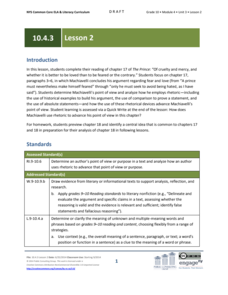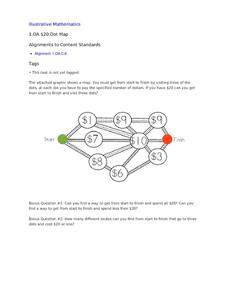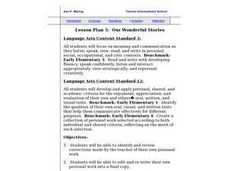EngageNY
Grade 10 ELA Module 4, Unit 2, Lesson 20
Using the resource, scholars work in small groups to rehearse a selected scene from Shakespeare's Macbeth. Finally, they present their interpretive dramatic readings to a group of peers or the whole class and complete a self-assessment...
EngageNY
Grade 10 ELA Module 4: Unit 2, Lesson 12
How do the Three Witches' interactions with Macbeth advance the plot of Shakespeare's Macbeth? Learners complete a Quick Write to answer the question. They also participate in a whole-class dramatic reading of Act 4.1.
EngageNY
Grade 10 ELA Module 4: Unit 3, Lesson 4
According to Machiavelli, a good ruler does whatever it takes. Using the resource, scholars work in small groups to analyze quotes from The Prince and then participate in a whole-class discussion. To finish, pupils select a phrase and...
EngageNY
Grade 10 ELA Module 4: Unit 3, Lesson 2
How do rhetorical devices advance an author's point of view? Scholars consider this question as they continue exploring Machiavelli's The Prince. They work in small groups, annotating the text for evidence of rhetoric before engaging in...
EngageNY
Grade 11 ELA Module 1: Unit 2, Lesson 20
How does the setting impact other elements within a play? Using a helpful resource, scholars explore the question by completing a Quick Write after reading Act 5.1 of Shakespeare's Hamlet. Additionally, they engage in a whole-class...
EngageNY
Grade 11 ELA Module 2: Unit 2, Lesson 11
In Audre Lorde's poem "From the House of Yemanjá," the speaker describes her mother's two faces, adding a whole new meaning to the phrase "two-faced." Pupils first read the final stanza of the contemporary poem. With a Quick Write, they...
EngageNY
Analyzing the Content of a Model Essay: “How Ha’s Mother Is Turned ‘Inside Out’”
What are the psychological and emotional effects associated with being a refugee? Scholars consider the question by reading and analyzing an essay, "How Ha's Mother is Turned 'Inside Out.'" Once finished, they engage in a whole-class...
EngageNY
Taking a Stand: Equal Rights for Women
Equality for all? Scholars talk with partners to predict Shirley Chisholm's stand in her speech "Equal Rights for Women." They then read the speech and circle unfamiliar words to understand the meaning better. Readers go on to answer...
Curated OER
Language Change: The Origins of Names
In small groups or pairs, learners explore the origins of each others' names. An awesome idea, but you'll need to do the initial research to gather your class's names and their origins. Or, consider having each member of your class...
Texas Education Agency (TEA)
Road Blocks to Mental Health
According to the Center for Disease Control and Prevention (CDC), fewer than half of adults seek treatment for mental health disorders. Those interested in careers in mental health investigate why this is so by looking at the...
Curated OER
To Be (Half) Or Not To Be (Half)
First graders demonstrate various ways to represent and verify a whole or set separated in two, three, or four equal parts. Using interlocking cubes, Students model a part of a whole or a part of a set. They use appropriate tools and...
Curated OER
Divide and Conquer
Seventh graders analyze responses to different types of problems. Using pictures and diagrams, they explore and model the division of fractions. Students examine situations that call for division whether with the whole numbers or with...
Illustrative Mathematics
$20 Dot Map
Challenge the addition skills of young learners with this open-ended math problem. The task is simple, get from start to finish by connecting a series of three numbers. The trick is that the sum of the numbers must be less than...
Institute for Teaching through Technology and Innovative Practices
The Right Number of Elephants
How can you tell if a number of items is reasonable? Combine math and language arts with a fun lesson based on Jeff Shepard's The Right Number of Elephants. After reading the book, kids discuss amounts of other items and create...
Curated OER
Compare and Contrast Night to Life is Beautiful
After reading Elie Wiesel's Night, watching the movie Life is Beautiful, and researching World War II, class members write a comparison essay on the book and film. This includes a prior knowledge activity, discussion in whole and small...
Curated OER
Earth in the Solar System
A three-week unit designed to be completed in an elementary level, dual-language immersion classroom, this resource includes several lessons intended to introduce young learners to the solar system, the Earth and how the Earth compares...
Curated OER
"Music Be the Food of Love:" Found Poetry with Shakespeare and Hip-Hop
Lines from Shakespeare and from hip-hop artists provide learners with an opportunity to examine the literary devices these artists use to express their ideas about love. Groups use the provided lines to craft found poems, and then the...
Curated OER
What's the Weather Like? Primary Level
Elementary schoolers and language learners will shine with a series of games and activities that feature weather words. The exercises can be adapted for pairs, small groups, or whole class participation.
Curated OER
From George to Martha: Writing a Sonnet Using Primary Sources
What was the relationship like between George and Martha Washington? To protect their privacy, Martha Washington destroyed all her husband’s letters after his death so historians have little evidence of their lives together. Two letters...
Curated OER
Reinforcing Alphabet Names/Sounds
Getting comfortable with the sounds associated with each letter is crucial in a young learner's path to becoming literate. This lesson provides a terrific way to reinforce this skill in an engaging and fun manner. It's a game that the...
Curated OER
Pride and Prejudice: Darcy's Proposal to Elizabeth
Why did Elizabeth refuse Darcy’s first proposal? Was it pride or prejudice? Readers of Austin’s classic struggle with the significance of Darcy’s proposal and Elizabeth’s refusal by crafting personal response journals and sharing these...
Curated OER
Our Wonderful Stories: Lesson Plan 5
The fifth installment in a writing unit that culminates with a Hyperstudio illustrated group story project, this plan is ripe with ideas for ways to design group writing projects for elementary writers. Use the whole unit as a base from...
Curated OER
Telling A Story
Students brainstorm all the possible scenarios that would help them tell a story in detail with the whole class and with partners. They create web outlines to create a name story and then illustrate it with creative grammar usage and...
Southern Nevada Regional Professional Development Program
“Just a Minute” Focus: Adapting Speech
A little bit complicated, but a whole lot of fun. Show your class an episode of the British television game show Just a Minute. After an explanation of the rules (no repetition, hesitation, or deviation) groups develop topics, based on...
Other popular searches
- Whole Language Lesson Plans
- Whole Language Approach
- Whole Language Development
- Reading Whole Language
- Whole Language Method
- Whole Language Instruction
- Whole Language Shared Reading
- Language Arts Whole Class
- Esl Whole Language Method
- \"Whole Language Approach\























